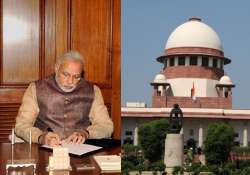Modi government asks SC not to interfere in executive decisions
New Delhi: The Narendra Modi government, on Wednesday, offhandedly told the Supreme Court that the latter should not interfere in the executive domain and suggested that the judiciary should better look into devising ways to

New Delhi: The Narendra Modi government, on Wednesday, offhandedly told the Supreme Court that the latter should not interfere in the executive domain and suggested that the judiciary should better look into devising ways to tackle the huge number of pending cases.
The suggestion came from attorney general Mukul Rohatgi during the hearing of a PIL filed by some well-known people who questioned the Centre's decision to appoint former defense secretary Shashikant Sharma as comptroller and auditor general (CAG), which audits government spending.
His appointment as CAG did not appeal to the petitioner and his counsel Prashant Bhushan said that Sharma's appointment can give rise to a possible conflict of interest as he will now be auditing purchase of those defense equipments which were procured during his term as a defense secretary.
Several defense equipments were procured during his tenure, which included VVIP helicopters from Agusta Westland which are now embroiled in controversies.
A bench of Chief Justice H L Dattu and Justices A K Sikri and Arun Mishra did not accept Bhushan's plea for examining the appointment of Sharma as CAG, a constitutional post, merely on grounds of apprehension of conflict of interest and preferred to seek Auditor General's opinion on a suggestion to make the appointment process transparent.
According to a report in Times of India, Rohatgi said that Sharma was a competent person and there was no allegation against his integrity and honesty.
He also said, “If the court attempts to frame guidelines for appointment of CAG, it would be at the teeth of constitutional provisions. The constitutional mandate is to leave it to the executive. The CAG is appointed by the President on the aid and advice of the council of ministers headed by the prime minister. There is no role for the courts.”
Bhushan, substantiating his stand, said that the courts had earlier laid guidelines for appointment to constitutional posts and cited example of two old judgments of the apex court in which it took powers of the executive to select judges.
He said, “This was rightly done to maintain independence of judiciary. A similar thing could be attempted for the appointment of CAG as it is a key post to maintain transparency in government spending and keep corruption at bay.”
Responding to this, the AG exclaimed that Supreme Court's judgment of taking away of executive's power to select judges was completely wrong.
He said that the selection and appointment of judges for the higher judicial bodies was with the executive and one cannot say that judges appointed executive prior to judgment were more independent than those who were appointed afterwards.
He further retorted that as far as CAG's post is concerned then in the last 20 years government has appointed persons of impeccable integrity only and even Sharma has similar qualities. He said that the latter has exceptional career without blemish.
He advised the apex court to rather concentrate on the overflowing number of pending cases instead of taking up issues relating to appointment of constitutional figures.
Later, AG clarified this also that still if the court's conscience was shocked by certain appointments to constitutional posts then SC can surely have a say in public interest.